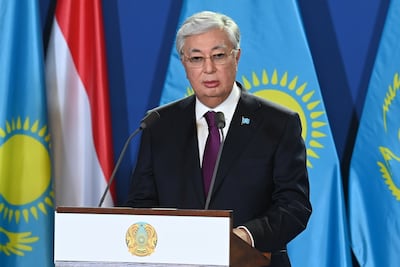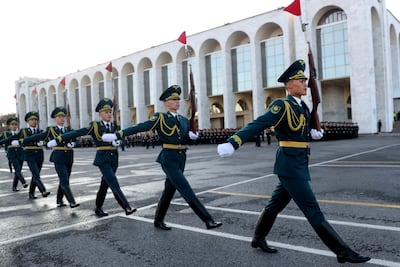During the US election campaign, the actor and comedian Sacha Baron Cohen was cajoled into “interviewing” the two (absent) presidential contenders on a US talk show, in the personae of his two most famous creations, Ali G and then Borat, a fictional journalist from Kazakhstan.
It seems that some Kazakh officials have been able to lean into Mr Baron Cohen’s humour – the country’s tourist board adopted the character’s phrase "very nice" in 2020 – but the Borat movie was banned for its offensiveness when it came out in 2006 in many parts of Asia and the Middle East. And it struck me, while watching the actor revive the role, that no one would come up with such a character today, for two reasons.
First, it’s an undeniably racist caricature. But second, Central Asia is becoming ever more important, and if audiences far away could not reasonably have been expected to know much about the region’s five countries nearly 20 years ago, they would be wise to sharpen up very soon.

Consider how many leaders have visited the “C5”, as Kazakhstan, the Kyrgyz Republic, Tajikistan, Turkmenistan and Uzbekistan are known together, in the past year or so. China’s President Xi Jinping made a Central Asia trip in July, having convened the first China-Central Asia summit last year. Both Mr Xi and Russia’s President Vladimir Putin were at the meeting of the Shanghai Co-operation Organisation held in Kazakhstan’s capital, Astana, that same month. German Chancellor Olaf Scholz had a three-day visit to the region culminating in a summit with all the C5 leaders in September.
Others who have been courting the region recently include France’s Emmanuel Macron, the Netherlands’ then prime minister Mark Rutte, Hungary’s leader Viktor Orban, the President of the European Council, Charles Michel, and South Korean President Yoon Suk-yeol, while the first-ever “C5+1 Presidential Summit” was held with US President Joe Biden during the UN General Assembly in New York in September 2023. Pipping the US to the post by several months, the first Gulf Co-operation Council-Central Asia summit took place the previous July in Jeddah.
It’s not hard to understand why the region is an increasing focus of attention. It is home to vast deposits of minerals including rare earth elements and rare metals. It has 38.6 per cent of the world’s manganese ore and 30.07 per cent of its chromium – both used for a variety of industrial purposes – and Kazakhstan is already the global leader in uranium production. To underline how important these deposits are, last month Australia’s Lowy Institute described Central Asia as an “emerging battlefield for strategic minerals”.
The region is also key to the “middle corridor” – the shortest route between western China and Europe, as opposed to “northern corridor” through Russia and the sea routes through the Indian Ocean and the Suez canal. The EU and international partners have pledged $10 billion to develop this route, also known as the Trans-Caspian International Transport Route, which is more a collection of different sections that can fit together in various ways, rather than a unitary line. This should bring journey times from one end to the other down to 15 days, compared to 19 days through the northern corridor, and up to 37 days by sea. Beijing is even more invested in this modern day iteration of the ancient Silk Road (it follows a similar path), which it calls the China–Central Asia–West Asia Economic Corridor of the Belt and Road Initiative. Over 260 projects with Chinese participation are already being implemented in the C5 countries.
Lastly, although food security is an issue in Central Asia as a whole, Kazakhstan is expected to be a be a leading producer of food surpluses over the next decade, according to a recent report by the Eurasian Development Bank. It is no coincidence that the secretariat and director general of the Islamic Organisation for Food Security, a partner of the Global Food Security Summit which just took place in Abu Dhabi, are permanently based in the Kazakh capital.
There is also a growing confidence in the region. Anyone thinking of them only as five countries that used to be part of the Soviet Union needs to refresh their lens. As a Carnegie Endowment analysis put it: “The region is no longer a backdrop for the new Great Game, nor is it anyone’s backyard.”

The C5 have been far from supportive of Russia’s position in the Ukraine war, with Kazakh President Kassym-Jomart Tokayev actually declaring right in front of Mr Putin in St Petersburg in 2022 that his country did not recognise pro-Russian “quasi-state territories” in Ukraine or elsewhere. That was bold, considering Russian forces had come to his aid and helped quell unrest in Kazakhstan as fellow members of the Moscow-led Collective Security Treaty Organisation only five months before.
But then Mr Tokayev, who appears to be emerging as a de facto first-among-equals of the C5, has ambitions for the five to work ever closer, “to shape the modern identity of Central Asia”, as he wrote in an article last August, and proposed a roadmap for regional integration and closer cooperation in defence and security at a C5 summit the same month.
Could a nascent Central Asian Union be far off? Either way, I believe this region to be one which the wise will watch closely. Something akin to a new middle power may be on the cusp of appearing at the heart of the Eurasian landmass. Baron Cohen’s comments about a country “no one had ever heard anything about” will then seem as quaint – and patronising – as perhaps they always were.

